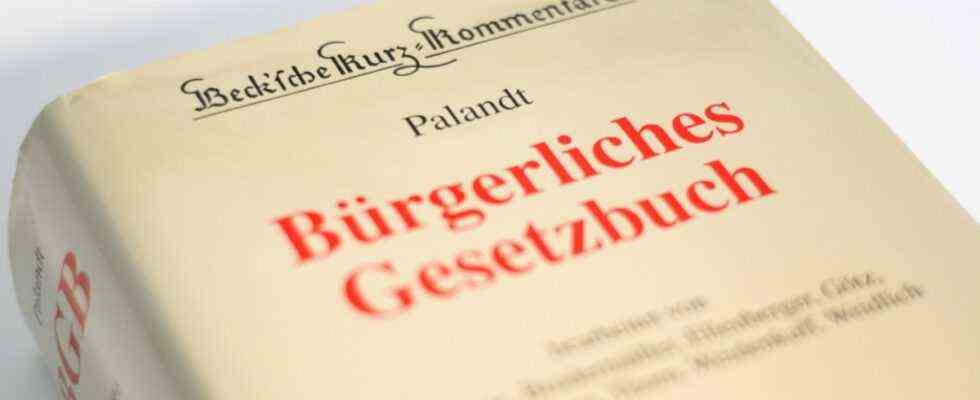Prominent National Socialists are still very present in German courtrooms in 2021. When judges want to look up something, they often use the “Palandt”, the most important legal commentary on the civil code. The manual, currently in its 80th edition by Verlag CH Beck, has been named Otto Palandt since 1938. He was a member of the NSDAP and president of the Reich Judicial Examination Office. Almost all dishes also use the “Schönfelder”, the most important collection of laws, also from CH Beck. It is named after Heinrich Schönfelder, NSDAP lawyer.
Now the traditional Munich publisher has surprisingly announced that it will say goodbye to the old Nazi namesake. On Tuesday the publisher announced: The “Palandt” will be renamed. It was time. The reference work will in future bear the name of Christian Grüneberg. Grüneberg, today a judge at the Federal Court of Justice, is known only to a few in the legal world. However, on behalf of the publisher, he coordinates the work of the many professors who contribute to the legal commentary. From the next, the 81st edition, which is due to appear in November, his name will be on practically every judge’s desk.
The Schönfelder Law Collection is also to be renamed. It is to be published in the future by the President of the German Lawyers’ Association and will also be named after him: Mathias Habersack. He is professor of civil law and corporate law at the Ludwig Maximilians University in Munich. The previous namesake Schönfelder had already died in 1944. The numbering of the laws still comes from him today. In the collection of laws, the civil code bears the number 20. Initially, the NSDAP party program and various racial laws came in positions 1 to 19.
Most recently, politicians from green state ministers of justice to the SPD federal minister of justice and the Bavarian CSU state minister of justice appealed to Beck-Verlag. “The namesake for collections of laws and comments must be personalities of integrity,” said CSU Minister Georg Eisenreich. “No National Socialists.” The decisive impetus now came from Eisenreich. In May he commissioned an independent historical study to re-examine the Nazi past of the namesake. At the same time, he advised the publisher Hans Dieter Beck not to let himself drift too long, but to clean it up.
“Maunz / Dürig” and “Blümich” are also given new names
Beck-Verlag is now taking the opportunity to rename one of the most important comments on the Basic Law. The standard work “Maunz / Dürig” is called after its founder Theodor Maunz (1901-1993). He was an influential law professor during the Nazi era. After 1945 he was a member of the Constitutional Convention in Herrenchiemsee, then Bavarian Minister of Culture for the CSU. In 1964 he had to resign because of his Nazi past, but then advised the right-wing extremist DVU of the Munich publisher Gerhard Frey and wrote under a pseudonym for his newspaper.
The reference work will in future be called “Dürig / Herzog / Scholz”, announced the Beck-Verlag. Maunz, who died almost 30 years ago, will no longer be honored, but instead the current co-authors of this work, the former President of the Constitutional Court and Federal President Roman Herzog and the former Minister of Defense and constitutional lawyer Rupert Scholz.
Finally, the publisher announces that it will also rename a standard commentary on tax law, the “Blümich”. This work is currently in its 157th edition under the name of Walter Blümich, who from 1933 headed the income tax department in the Reich Ministry of Finance and promoted tax discrimination against Jews. In future it will bear the name of the current editors Peter Brandis and Bernd Heuermann.
Is that the right way to deal with the Nazi past? There is no doubt that the former namesake are only that today: namesake. The contents of the legal works have long since been denazified. Is it then wise to simply scrub the history clean so that nothing is reminiscent of the Nazi era? In the past few years, Beck-Verlag had resisted. The publisher argued that they wanted to cling to the names that were polluted by the Nazi regime, precisely in order to let the readers “stumble” over the history. The counter-argument has now apparently prevailed. It is “essential that the historical awareness of the National Socialist injustice is heightened in all areas”: This is how the CSU Minister Eisenreich put it in a letter on the subject in the spring.

